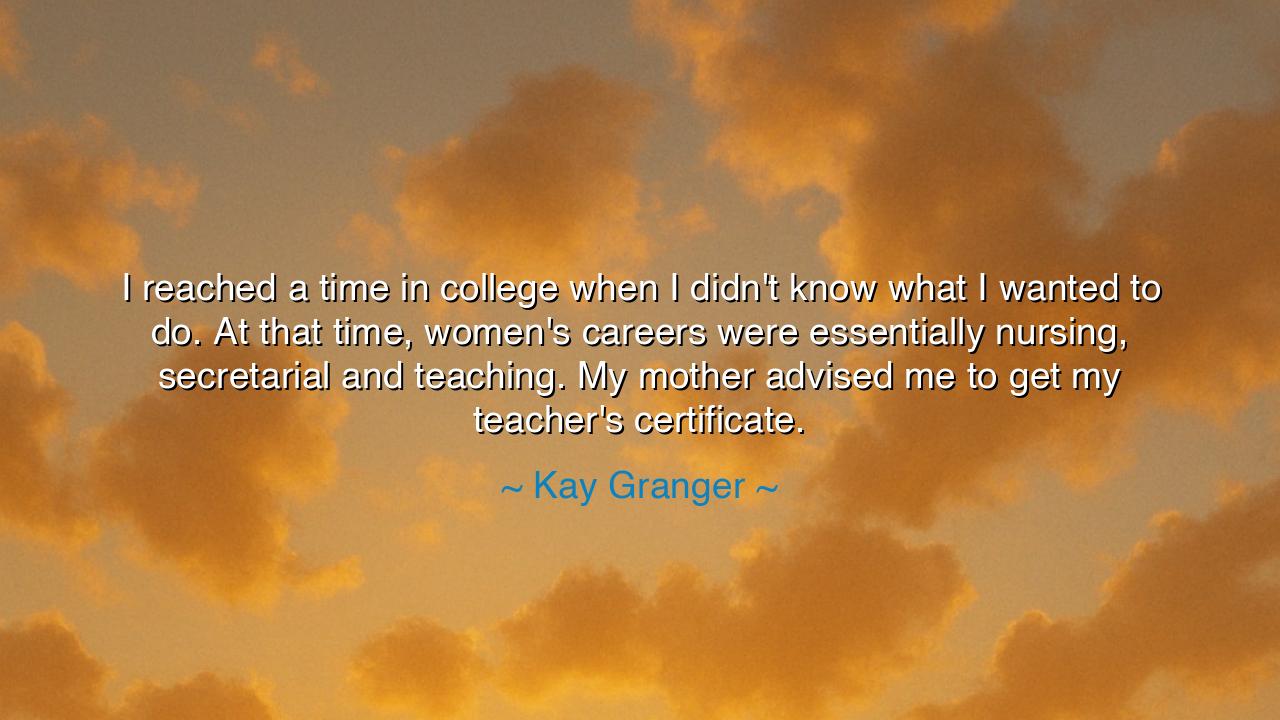
I reached a time in college when I didn't know what I wanted to
I reached a time in college when I didn't know what I wanted to do. At that time, women's careers were essentially nursing, secretarial and teaching. My mother advised me to get my teacher's certificate.






The words of Kay Granger—“I reached a time in college when I didn't know what I wanted to do. At that time, women's careers were essentially nursing, secretarial and teaching. My mother advised me to get my teacher's certificate”—shine like a window into both personal uncertainty and the broader struggles of an era. They remind us that choice, so often celebrated in modern times, was once tightly bound by the limits of society’s expectations. To be a woman in those days was to live within narrow corridors of opportunity, and yet even within those confines, there was wisdom, resilience, and the quiet power of mothers who guided their daughters toward survival and strength.
The origin of this truth lies in the history of women’s labor. For generations, women were told their paths were confined: they might heal through nursing, they might serve through secretarial work, or they might instruct through teaching. These were noble professions, yet they were also fences, built not by nature but by culture. Granger’s uncertainty as a young college student reflects the weight of these boundaries. Her mother’s counsel to secure a teacher’s certificate was both a recognition of limitation and an act of foresight—ensuring her daughter a livelihood, even if the horizon seemed small.
History offers many echoes of this story. Consider Clara Barton, who began as a teacher in the mid-19th century because opportunities for women were so few. Yet her path as a teacher became the foundation of greater things—she went on to become the founder of the American Red Cross, reshaping the role of women in public life. What began as a concession to limited careers blossomed into heroism. In the same way, Granger’s early uncertainty, shaped by her mother’s advice, eventually led her not only into teaching, but later into politics, where she became the first Republican woman to represent Texas in the U.S. House of Representatives.
The emotional depth of this quote lies in the honesty of not knowing what to do. Every human being comes to such a crossroads: a moment when the future is clouded, and the heart is unsure. In Granger’s time, this struggle was compounded for women by the weight of societal restriction. To not know what to do was not merely confusion—it was the painful awareness that the menu of choices was slim. Yet within this narrowness, courage still bloomed. Mothers, mentors, and elders offered guidance that preserved possibility, even when the world was reluctant to open its doors.
There is also something heroic in the quiet strength of her mother’s wisdom. For to counsel her daughter toward teaching was not to chain her, but to equip her. A certificate was not merely a document; it was a shield, a means to independence, a proof of skill that no one could take away. And though Granger’s mother may not have foreseen the future, she laid a foundation upon which her daughter could stand, and from which she could later leap. It is a reminder that even in limitation, preparation plants the seeds of freedom.
The lesson for us is clear: do not despise small steps, nor view narrow beginnings as prisons. What seems like confinement may, in truth, be the training ground for greater destinies. Just as Barton’s teaching prepared her for leadership in humanitarian work, just as Granger’s certificate gave her a path to independence and eventually politics, so too can humble beginnings bear unforeseen fruit. Guidance from elders, even when it seems cautious or ordinary, often contains hidden foresight that later reveals its value.
What, then, shall we do? Let us be patient when we stand in uncertainty, and let us listen with respect to those who have walked before us. Let us not be disheartened by small opportunities, but seize them with vigor, for they may be the foundation of greater works. And let us strive, in our own time, to widen the corridors of opportunity for others, so that no young woman or man feels trapped by the narrowness of society’s imagination.
Thus, Kay Granger’s words endure as both testimony and teaching: uncertainty can be transformed into destiny when met with wisdom and preparation. A certificate gained in doubt may become the key to a life of service and achievement. And so, we must live with courage, knowing that even when the path seems narrow, the horizon beyond may be vast.






AAdministratorAdministrator
Welcome, honored guests. Please leave a comment, we will respond soon